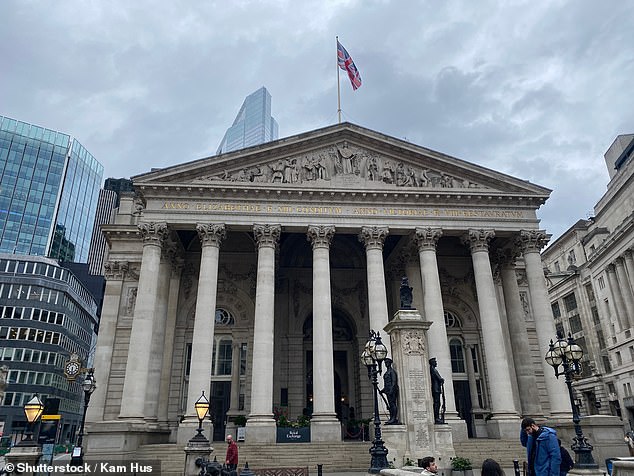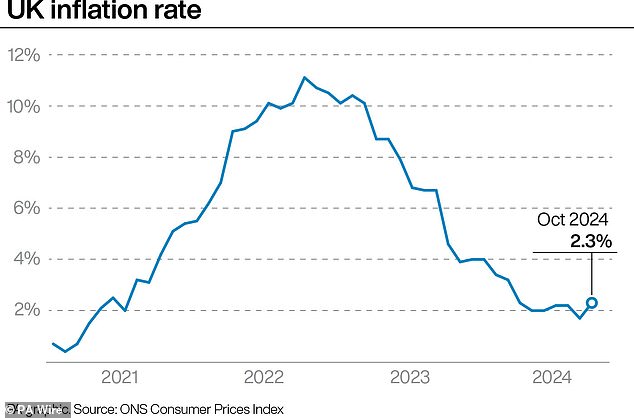There will be no early Christmas present from the Bank of England.
The jump in inflation announced today – from 1.7 percent in September to 2.3 percent in October – has ended any lingering hopes of another interest rate cut this year.
The cost of living has once again been pushed up by rising household energy bills, with the top price rising from £1,568 to £1,717 a year at the beginning of last month.
Every household in the country will feel the impact of more expensive heating right now, as an Arctic blast hits Britain.
A further increase in the price limit is expected in January, adding even more pressure to household finances and inflation.
Inflation has a direct relationship with the cost of borrowing and, in particular, the cost of mortgages faced by millions of homeowners and those looking to move up the property ladder.
This is because the Bank of England normally raises interest rates to control inflation and lowers them when inflation is no longer a threat.
And today’s news does not make for pleasant reading for those hoping for a round of quick rate cuts.
Inflation soared to 2.3 percent in October as fears grow over the impact of the budget and global trade tensions.

The jump in inflation announced today, from 1.7 percent in September to 2.3 percent in October, has dashed any hopes of another interest rate cut by the Bank of England (file image)
The jump in inflation from 1.7 percent to 2.3 percent was the largest increase in a single month since October 2022, although inflation was a punishing 11.1 percent back then.
And the 2.3 percent price increase from a year earlier was larger than feared.
That means the Bank of England is less likely to cut interest rates in the coming months.
In fact, the next step may not come before spring. Just a few weeks ago it was expected that a succession of cuts would occur in the coming months.
Bank-set rates influence how much lenders charge borrowers for mortgages.
Mortgage rates soared as the Bank raised interest rates from a record low of 0.1 percent in December 2021 to a high of 5.25 percent in August 2023 to reduce inflation from its high above 11 percent.
The rates remained unchanged until August of this year, when the Bank cut them to 5 percent. It cut them for the second time this month to 4.75 percent.
So far, reductions have been much slower than many would have liked, meaning mortgage rates remain high.

The cost of living has risen again due to rising household energy bills – the top price rose from £1,568 to £1,717 per year at the beginning of last month (file image)
But it is not just the impact of rising energy bills on the current inflation rate that worries the Bank.
The Chancellor’s Budget is also seen as a threat to inflation: raising the minimum wage and increasing national insurance contributions paid by employers will likely lead to higher prices and also cost jobs.
Bank of England Governor Andrew Bailey warned yesterday that the measures introduced by Rachel Reeves mean further rate cuts must be “gradual”.
In other words, the Chancellor’s spending spree – paid for by higher taxes and more borrowing – risks making mortgages more expensive than they would otherwise have been.
Another blow to the “workers” he promised to help.
Global events are also influencing borrowing costs in the UK, from the election of Donald Trump in the United States to the impact of war in Ukraine and the Middle East on energy prices.
But while a rate cut by Christmas now looks unlikely, the inflation outlook means interest rates are likely to fall again next year.
However, the problem for many is that the cuts may not come as quickly as they would like.


